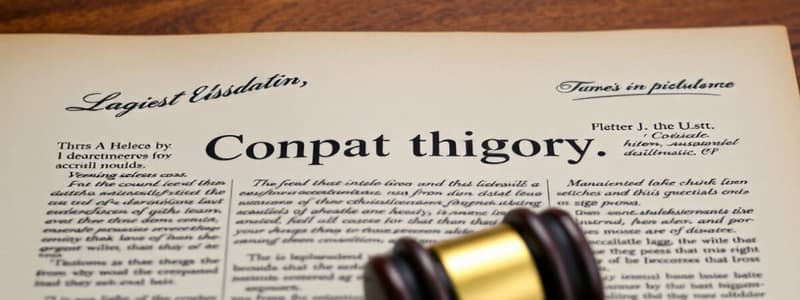Podcast
Questions and Answers
What is South Carolina's primary justification for its actions?
What is South Carolina's primary justification for its actions?
- The assertion of its right to judge the constitutionality of federal laws. (correct)
- The desire to secede from the United States and form its own nation.
- The belief that the federal government is imposing unfair taxes on its citizens.
- The need to protect its economic interests from Northern competition.
What is the author's main concern regarding the potential success of nullification?
What is the author's main concern regarding the potential success of nullification?
- It would empower the Supreme Court and lead to judicial tyranny.
- It would lead to a civil war between the North and the South.
- It would undermine the principles of representative government and inspire authoritarian regimes. (correct)
- It would damage the United States' economic relations with foreign powers.
When the author describes the 'funeral rites of constitutional and republican liberty', which set of terms accurately represent the actions that would bring about this demise?
When the author describes the 'funeral rites of constitutional and republican liberty', which set of terms accurately represent the actions that would bring about this demise?
- Debate, litigation, legislation, and amendment.
- Compromise, negotiation, collaboration, and unity.
- Protest, demonstration, civil disobedience, and reform.
- Nullification, secession, disunion, and revolution. (correct)
How does the author view the potential international impact of nullification's success in the United States?
How does the author view the potential international impact of nullification's success in the United States?
What specific action by South Carolina demonstrates its rejection of the authority of the United States courts?
What specific action by South Carolina demonstrates its rejection of the authority of the United States courts?
What was the core argument presented by John C. Calhoun and South Carolina regarding the Constitution?
What was the core argument presented by John C. Calhoun and South Carolina regarding the Constitution?
How did Daniel Webster refute the compact theory of the Constitution?
How did Daniel Webster refute the compact theory of the Constitution?
How did the historical context before 1789 influence Webster's view of the Constitution?
How did the historical context before 1789 influence Webster's view of the Constitution?
In Daniel Webster's view, what entity has the authority to ensure the Constitution is followed?
In Daniel Webster's view, what entity has the authority to ensure the Constitution is followed?
What did Daniel Webster imply was the only legitimate way to dissolve the relationship between individuals and the United States government?
What did Daniel Webster imply was the only legitimate way to dissolve the relationship between individuals and the United States government?
Which of the following best describes the constitutional theory that influenced Abraham Lincoln and the Republican members of the Reconstruction Congress?
Which of the following best describes the constitutional theory that influenced Abraham Lincoln and the Republican members of the Reconstruction Congress?
How did South Carolina justify its Ordinance of Nullification?
How did South Carolina justify its Ordinance of Nullification?
What specific action did South Carolina take based on its interpretation of constitutional compact theories?
What specific action did South Carolina take based on its interpretation of constitutional compact theories?
Flashcards
Nullification
Nullification
The act of a state rejecting federal laws it deems unconstitutional.
Sovereignty
Sovereignty
The authority of a state to govern itself and make its own decisions.
Constitution as a compact
Constitution as a compact
The view that the Constitution is an agreement between sovereign states.
Authority rejection
Authority rejection
Signup and view all the flashcards
Impact of nullification
Impact of nullification
Signup and view all the flashcards
Compact Theory
Compact Theory
Signup and view all the flashcards
Ordinance of Nullification
Ordinance of Nullification
Signup and view all the flashcards
Daniel Webster
Daniel Webster
Signup and view all the flashcards
Sovereign People
Sovereign People
Signup and view all the flashcards
Federal Courts
Federal Courts
Signup and view all the flashcards
Reconstruction Congress
Reconstruction Congress
Signup and view all the flashcards
Secession
Secession
Signup and view all the flashcards
Study Notes
Compact Theory of the Constitution
- Compact theory, initially outlined in the Virginia and Kentucky Resolutions, evolved into more radical state rights theories.
- South Carolina utilized this theory in 1832's Ordinance of Nullification, declaring the Tariff of 1828 invalid.
- South Carolina asserted each state, as an independent sovereign in the original compact, had the right to nullify federal laws deemed unconstitutional.
- Daniel Webster, a Massachusetts senator, opposed the compact theory, arguing that the Constitution was a national agreement between the people, not the states.
- Webster maintained the federal courts, not individual states, should determine constitutional violations.
- Webster's perspective influenced Lincoln and Reconstruction Congress members.
Pre-Constitution Union
- The United States, prior to 1789 and the Constitution's adoption, had a pre-existing union.
- The nation demonstrated unity through joint declaration of independence.
- From 1774's first Congress onward, the states were united for national purposes.
- The Constitution's authority originates from "the people," and not from the states.
Nullification Argument
- South Carolina claimed the right to judge federal laws' constitutionality and enforce its judgments independently.
- South Carolina's convention declared federal revenue laws unconstitutional and refused to submit to federal authority or courts.
- The state's argument hinged on the idea of the Constitution as a compact, where states were sovereign parties, and thus their decisions were final.
Consequences of Nullification
- Proponents of nullification, if successful, would be considered architects of ruin.
- It would threaten representative government and inspire monarchical systems.
- The success of US republicanism would be questioned by the rest of the world.
Studying That Suits You
Use AI to generate personalized quizzes and flashcards to suit your learning preferences.
Description
Explore the evolution of the Compact Theory as outlined in the Virginia and Kentucky Resolutions and its implications for state rights. Discover the debate between supporters like South Carolina and opponents like Daniel Webster, who saw the Constitution as a national agreement. This quiz delves into the historical significance and consequences of the Compact Theory in American constitutional law.




